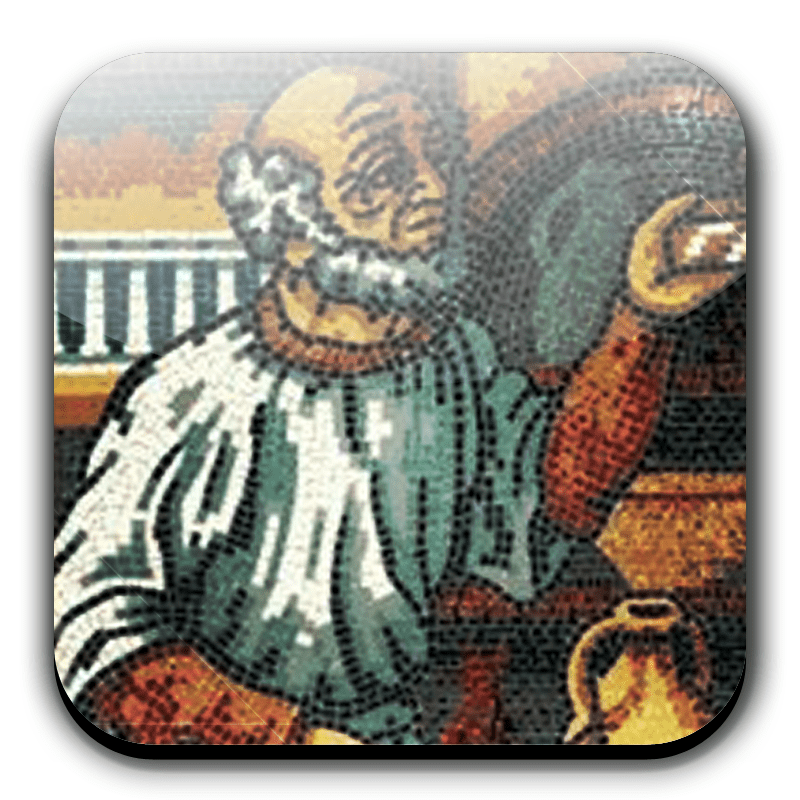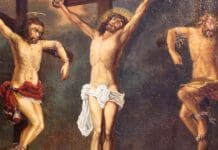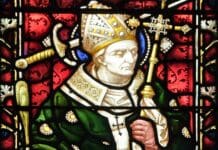Pope St. Gelasius I, was born in Rome, in the fifth century, the son of an African named Valerius. Some have asserted that Gelasius was a black African by descent, because the Liber Pontificalis plainly states that he was “Natione Afer” (‘African by birthright’). He is one three Popes of African heritage.
On his election to the papacy, Gelasius at once showed his strength of character and his lofty conception of his position by his firmness in dealing with the adherents of Acacius. Despite all the efforts of the otherwise orthodox patriarch, Euphemius of Constantinople, and the threats and wiles by which the Emperor Anastasius tried to obtain recognition from the Apostolic See, Gelasius, though hard-pressed by difficulties at home, would make no peace that compromised in the slightest degree the rights and honor of the Chair of Peter.
The constancy with which he combated the pretensions, lay and ecclesiastical, of the New Rome; the resoluteness with which he refused to allow the civil or temporal pre-eminence of a city to determine its ecclesiastical rank; the unfailing courage with which he defended the rights of the “second” and the “third” sees, Alexandria and Antioch, are some of the most striking features of his pontificate. It has been well said that nowhere at this period can be found stronger arguments for the primacy of Peter’s See than in the works and writings of Gelasius. He is never tired of repeating that Rome owes its ecclesiastical princedom not to an ecumenical synod nor to any temporal importance it may have possessed, but to the Divine institution of Christ Himself, Who conferred the primacy over the whole Church upon Peter and his successors.
In his dealing with the emperor he is at one with the great medieval pontiffs. “There are two powers by which chiefly this world is ruled: the sacred authority of the priesthood and the authority of kings. And of these the authority of the priests is so much the weightier, as they must render before the tribunal of God an account even for the kings of men.”
St. Gelasius’s pontificate was too short to effect the complete submission and reconciliation of the ambitious Church of Byzantium. Not until Hormisdas (514-23) did the contest end in the return of the East to its old allegiance. Troubles abroad were not the only occasions to draw out the energy and strength of Gelasius.
The Lupercalia, a superstitious and somewhat licentious vestige of paganism at Rome, was finally abolished by the pope after a long contest. Gelasius’s letter to Andromachus, the senator, covers the main lines of the controversy.
A stanch upholder of the old traditions, Gelasius nevertheless knew when to make exceptions or modifications, such as his decree obliging the reception of the Holy Eucharist under both kinds, bread and wine. This was done as the only effective way of detecting the Manichæans, who, though present in Rome in large numbers, sought to divert attention from their hidden propaganda by feigning Catholicism. As they held wine to be impure and essentially sinful, they would refuse the chalice and thus be recognized.
To Gelasius we owe the ordinations on the ember days, as well as the enforcement of the fourfold division of all ecclesiastical revenues, whether income from estates or voluntary donations of the faithful, one portion for the poor, another for the support of the churches and the splendor of Divine service, a third for the bishop, and the fourth for the minor clergy.
In his zeal for the beauty and majesty of Divine service, Gelasius composed many hymns, prefaces, and collects, and arranged a standard Mass-book, though the Missal that has commonly gone by his name, the “Sacramentarium Gelasianum”, belongs properly to the next century. How much of it is the work of Gelasius is still a moot question. Though pope but for four years and a half, he exerted a deep influence on the development of church polity, of the liturgy and ecclesiastical discipline. A large number of his decrees have been incorporated into the Canon Law.
In his private life Gelasius was above all conspicuous for his spirit of prayer, penance, and study. He took great delight in the company of monks, and was a true father to the poor, dying empty-handed as a result of his lavish charity. Dionysius Exiguus in a letter to his friend, the priest Julian, gives a glowing account of Gelasius as he appeared to his contemporaries.
As a writer Gelasius takes high rank for his period. His style is vigorous and elegant, though occasionally, obscure. Comparatively little of his literary work has come down to us, though he is said to have been the most prolific writer of all the pontiffs of the first five centuries. There are extant forty-two letters and fragments of forty-nine others, besides six treatises, of which three are concerned with the Acacian schism, one with the heresy of the Pelagians, another with the errors of Nestorius and Eutyches, while the sixth is directed against the senator Andromachus and the advocates of the Lupercalia. The best edition is that of Thiel.
The feast of St. Gelasius is kept on 21 Nov., the anniversary of his interment, though many writers give this as the day of his death.


















Hi there, just become aware of your blog thru Google, and located that it’s truly informative. I am gonna be careful for brussels. I’ll be grateful for those who proceed this in future. A lot of other folks might be benefited from your writing. Cheers!